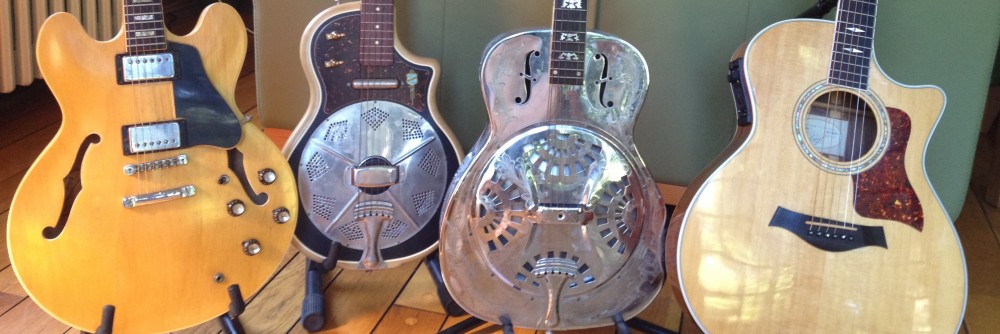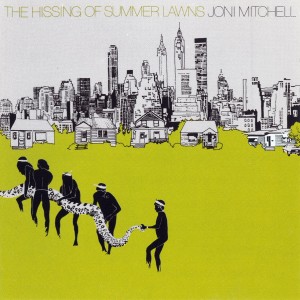An appreciation of JM first published on the PBS Need To Know website in 2011 – given a light edit here
by Tom Casciato
The Oscars are over, last year’s movies are exactly that. But there’s one scene I can’t let go of.
But first, an aside. Hollywood pictures have been milking scenes of actors singing or emoting to pop songs for about three decades now, ever since that too-cute “Big Chill” gang rocked out in the kitchen to “Ain’t Too Proud to Beg,” and — much more amusingly — the incarcerated Eddie Murphy howled “Roxanne” under the headphones in “48 Hours.” There have been countless imitations since, and it’s pretty hard to be charmed or surprised by any of it anymore.
Then along come Annette Bening and Mark Ruffalo, bringing a fresh twist to a tired gimmick in “The Kids Are All Right.” It’s the scene where Bening’s lesbian character and Ruffalo’s straight one psychically bond while singing Joni Mitchell’s lovely “All I Want” as an a cappella duet over dinner. (Meanwhile a perplexed Julianne Moore, whose character has been sleeping with each of them, looks on forlornly, utterly excluded from their vocal hookup.) The scene became significant for me with Bening’s declaration: “You don’t meet too many straight guys who love Joni Mitchell!”
There was a time I was somewhat afraid to say so. Like in high school (mine was of the all-boys variety), when it would have been socially unwise to admit that I found ZZ Top’s “Tush” dull, if not obnoxious, but, hey, have you checked out the way Joni Mitchell uses that Burundian drum ensemble on The Hissing of Summer Lawns?
If you don’t love Joni Mitchell, there’s a good chance you’ve never even heard of The Hissing of Summer Lawns. It was the 1975 followup to the previous year’s Court and Spark, which had been one of the few albums of the era to qualify both as artistic triumph and commercial breakthrough. Hissing was where a lot of people got off the Joni bus. Up till then her albums had managed to define inventive lyrical and musical territory while still containing a healthy enough number of pop-inflected songs like “All I Want” to allow her to sell a bundle of records.
With Hissing that all changed. The aforementioned Burundian drums were found on a song called “The Jungle Line,” by leaps the most melodically challenging track she had ever released. The rest of the album is slightly more accessible but filled with unapologetically ambitious arrangements, sophisticated melodies, knowing feminist lyrics – in other words, nobody’s idea of a hit. Songs like “In France They Kiss on Main Street,” “Don’t Interrupt the Sorrow” and “The Boho Dance” weren’t quite pop, weren’t quite jazz, weren’t quite like anything anyone else was doing. And so she was, in many quarters, demeaned for it.
I recall my desire (still strong some three and a half decades later) to defend her honor when Rolling Stone’s Stephen Holden attacked Hissing’s musicality in his review of the album. Among his other charges, he said the synthesizer on the song “Shadows and Light” sounded like “a long solemn fart.”
(An aside: the way I remembered it, Holden had compared Mitchell’s synth sound not to a long solemn fart, but to a “goose fart.” Then I Googled it, and it turns out that “goose fart” – or, to be precise, “geese farting on a muggy day” — was the term guitarist Leo Kottke used to describe the sound of his own singing voice. A further aside: Kottke wasn’t far off. But whether of the goose or the long-and-solemn variety, a fart is still a fart, and I took what I read in that magazine to be fighting words.)
Not, by the way, that the synth on “Shadows and Light” didn’t sound like a fart. (Judge for yourself.) That wasn’t the point. To my mind, Stephen Holden had besmirched Joni’s honor at a time when — to use a hackneyed phrase from those dull, post-Beatles, pre-punk days — she was taking it to the limit while rock stars who weren’t taking it to the limit were becoming jillionaires filling my car speakers with the unambitious likes of “Take It to the Limit.”
I’m thinking, the radio is rife with sonic flatulence, and you want to go picking on Joni Mitchell?
(Another aside: Rolling Stone provoked me again when it ranked Mitchell 72nd on its 2003 list of the 100 all-time greatest guitarists, two spots below Eddie Van Halen, two above Johnny Winter. It wasn’t that the magazine was dissing her this time. It was just that it’s incomprehensible to me that you could put Joni Mitchell on this list at all. Not because she isn’t a great guitar player — she is — but because her playing is unique. It’s pointless to compare her with others. It’s like trying to rank Thelonious Monk on the all-time piano player list. He’s not “better” or “worse” than Bud Powell. He’s his own species, his own genus. Like the aardvark. Like Joni Mitchell.)
Last fall Mitchell got ranked again. The dating site okcupid.com did a word cloud in which it calculated which terms came up most often among the personal profiles of its users. If you count, you’ll find that she’s 18th on the list of The Stuff Gay People Like, four slots higher than “American Idol,” four lower than “the theater.” I’m not qualified to comment on the validity of that ranking. But I do know that 18th on the list of The Stuff Straight People like is “Burn Notice.” Now I have nothing against “Burn Notice,” but it ain’t no Hissing of Summer Lawns. And anyway, at the end of the day, loving Joni Mitchell is not a gay-or-straight thing. It’s a you-get-it-or-you-don’t thing. And while it’s impossible to conceive of Annette Bening and Mark Ruffalo teaming up in a picture as shrewdly commercial as “The Kids Are All Right” to sing a duet of “In France They Kiss on Main Street,” you’ll never get it if you don’t at least give it a chance.
(A final aside. If my memory is correct — and I’m not saying it is — the first time I saw Joni Mitchell in concert was the night after my grandmother’s funeral in 1974. My Grandma spoke almost no English, she used her hands to make homemade pasta — on a chitarra, no less — and was passing with her generation into history; Joni Mitchell was hyper-literate, she used her hands to form utterly original chord voicings on her detuned guitar, and her generation was just coming into its own. It was, to my very young eyes, a whole new kind of womanhood on display that night.)
When Elvis Costello called The Hissing of Summer Lawns “a misunderstood masterpiece” in the 2004 Vanity Fair piece he wrote about Mitchell, I felt almost thoroughly vindicated. But I still can’t get over that Rolling Stone review, and if I ever meet Stephen Holden, I might challenge him to a duel.












It’s not a question of genres, Joni Mitchell is about that. She’s a legend in her own time with a musical legacy that will be fondly appreciated one hundred years from now. She’s been an artist in the best acception of the word: skilled, daring and fulfilling.